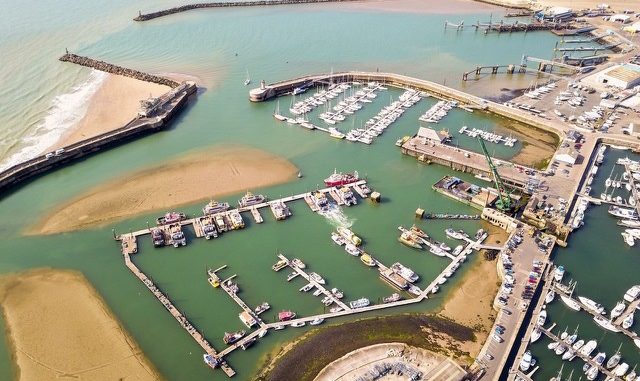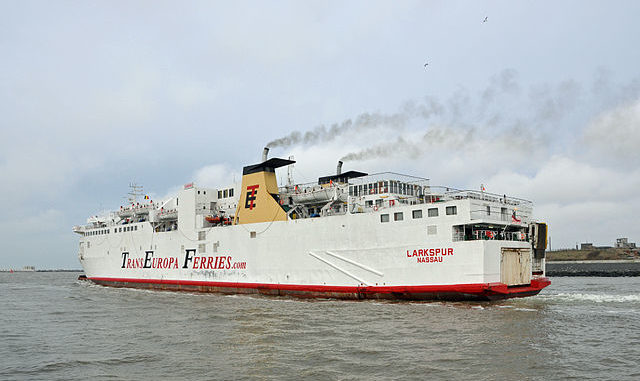
Dredging at Ramsgate Port will begin on January 4 in preparation for ferry services in late March, claim the directors of Seaborne Freight.
The firm, which is proposing to run a Ramsgate/Ostend service, says operations will start in late March – to coincide with the UK withdrawal from the European Union – initially with two ships.
Despite prolonged negotiations no announcement has yet been made that a deal has been signed with Thanet council for the route.. A service had been mooted to start in March this year but the date came -and went – with no sign of progress.
But Seaborne has now been awarded a government contract worth £13.8million to “supply additional freight capacity on ferry services between England and Belgium in order to minimise the potential disruption of trade across the Short Straits in the event that the UK leaves the EU without an agreement.”
The firm is one of three which received a share of £107million.The others are French company Brittany Ferries, receiving £46m and DFDS with an award of £47m.
The ferry services under the contracts have to be operational by March 29, the day Brexit comes into force.
The aim is to alleviate pressure on Kent’s roads which would come with a ‘hard border’ and could lead to a backlog of traffic, particularly HGVs, trying to access Dover Port and the Eurotunnel.
‘Development phase’

In a statement Seaborne Freight says directors and shareholders have been working over the last two years on a business plan to reintroduce the Ramsgate to Ostend ferry service from early 2019.
A spokesman said: “During the development phase and pending the finalisation of robust funding arrangements, the business has been financed by the shareholders.
“This phase has included locating suitable vessels, making arrangements with the ports of Ostend and Ramsgate, building the infrastructure, such as bunkering, as well as crewing the ferries once they start operating. A work-up phase is part of the programme and training will be provided by a specialist organisation.
“The operational base is located in Folkestone where the Seaborne team is currently based, but will move to Ramsgate as soon as the port has been dredged and the facilities to operate the booking and loading services have been finalised.
“It was intended to start the service in mid-February but this has now been delayed until late March for operational reasons. This coincides with the Department for Transport’s Freight Capacity Purchase Agreement with Seaborne which is part of their preparations to increase ferry capacity in the unlikely event of a no-deal BREXIT.”
‘Four ferries by Summer’
Seaborne say although operations will begin with two ferries this will “very quickly increase to four by late summer.”
There has been no indication of which vessels are to be used for the route. The port cannot currently accommodate the larger cross-Channel ferries with just one vessel identified as being capable of using the ro-ro facilities due to the restricted size. This is the former Dover-Calais ferry MS Nord Pas de Calais which currently operates between Spain and Morocco.
Significant dredging work need to take place at Ramsgate Port.
However, members of Ramsgate Action group have questioned the award of the contract to “a company that has no ships, no funds, no identified investors, no employees and no real premises,” and no apparent phone line for the Belgian end of the route. The group adds: “It is beyond belief that Chris Grayling could approve handing over £14 million of taxpayers’ money in these circumstances.”
A shipping industry insider added that it was “incomprehensibe that neither the Baltic Exchange, nor one of the big six shipbroking companies in the London were approached to advise on such an operation.”
Companies House
It has not yet been made clear what the funding arrangements are for the proposed service.
According to Companies House records the firm has declared fixed assets of £35,169, shares totalling £53, debtors amount due within one year of £6,364 and creditors amount due within one year of £416,607.
A Department for Transport spokesman said: “This contract was awarded in the full knowledge that Seaborne Freight is a new shipping provider, and that the extra capacity and vessels would be provided as part of its first services.
“As with all contracts, we carefully vetted the company’s commercial, technical and financial position in detail before making the award.”
Port role in Brexit resilience

There has not been a cross-Channel operation at Ramsgate since the collapse of TransEuropa in 2013 which left Thanet council owed an unpaid debt of £3.4 million accrued by the ferry firm in port fees.
Negotiations with ferry service providers since that date have been fruitless.
However, in November Thanet council said the Port of Ramsgate could have the potential to provide enough sailings to divert 3,360 lorry movements per day from the planned Operation Brock queuing system on the M20 and M26.
A spokesman said that a review of the port’s capability had been carried out and, with a £26million investment, Ramsgate has the potential for up to 24 sailings a day.
Some £51,700 in consultancy fees has been spent on marketing and business plans aimed at areas including bringing the ferry service back to the port.
The Port of Ramsgate has racked up a deficit of around £20million since 2010, according to Thanet council’s statement of accounts for each financial year from 2010/11 to 2017/18.
The figures exclude £5million in live export compensation and the TransEuropa Ferries debt.
Last year Thanet council said the figures included costs which are shared across other areas of the council for the running of its services, rather than being directly incurred in port running costs.
Read here: 8 proposals for Ramsgate Port that are yet to launch

